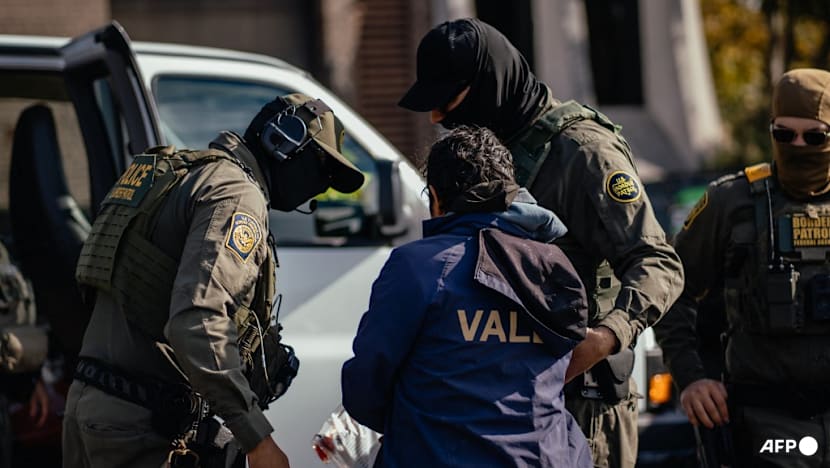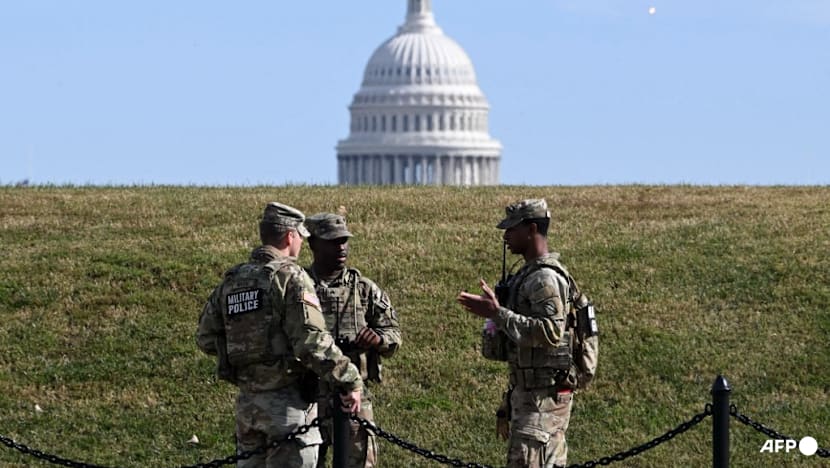Trump administration faces mounting backlash over expanding immigration crackdown
Amid sweeping immigration raids across the US, observers are questioning whether President Donald Trump’s administration has gone too far in its use of force.

US federal agents detain a man during an immigration raid in a residential neighbourhood in Chicago, Illinois, on Oct 31, 2025. (Photo: AFP/Getty Images/Jamie Kelter Davis)

This audio is generated by an AI tool.
WASHINGTON: The Trump administration’s sweeping immigration crackdown in the United States shows no signs of slowing, even amid pushback by the public and the courts.
Recent weeks have seen armed federal agents deployed in several Democratic-led cities, as part of US President Donald Trump’s vow to remove undocumented migrants.
Critics say the deployments are an illegal show of force, prompting lawsuits across the country.
FEAR ON THE STREETS
Last month, federal agents in military gear descended on a quiet, tree-lined neighbourhood in Chicago.
Two days earlier, locals elsewhere in the city were met with tear gas as they tried to prevent the arrest of a construction worker.
The incidents came soon after Trump warned on his social media platform, Truth Social, that Chicago was “about to find out why it’s called the Department of WAR” – a reference to his rebranding of the Department of Defense.
Amid rising unrest over his immigration policies, Trump also ordered National Guard troops to Los Angeles and Portland, saying they were needed to protect federal agents and property.
He has likewise called for troops to assist local police in cities such as Memphis and Washington DC.
The growing federal presence has instilled a sense of fear among immigrant communities, said Ernesto Castaneda, director of American University’s Immigration Lab which conducts research on migration issues.
“People are showing up in unmarked cars … the agents don't have a badge number. They have their faces covered. There's not really a uniform. Each group of agents looks different,” he added.
TRUMP ‘ONLY JUST GETTING STARTED’
National Guard troops are typically tasked with handling emergencies such as disasters, invasions or rebellions.
But the Trump administration has now ordered them to deal with crime and support immigration enforcement.
Aside from the National Guard, personnel from agencies not typically associated with immigration enforcement - including the Federal Bureau of Investigation and the Bureau of Alcohol, Tobacco, Firearms and Explosives - have been seen participating in raids.

Marie Price, a professor of geography and international affairs at George Washington University, said she thinks Trump is only just getting started.
“Trump learned a lot in his first term in office. He wasn't able to get anywhere near the traction,” she added.
“And so, he's come back ready to, and campaigned on, getting and deporting irregular undocumented migrants from the US.”
Price noted that Trump’s “Big Beautiful Bill” passed earlier this year gave the Department of Homeland Security “massive amounts of money” - over US$10 billion annually for four years - to detain and remove people.
LEGAL CHALLENGES
Officials say National Guard troops are needed to help carry out Trump’s mass deportation campaign and to clamp down on violence in Democratic-controlled cities, despite data showing fewer crimes being committed in many of them.
The deployment has prompted widespread condemnation, with state governments filing lawsuits to block the moves.
Some judges have sided with state governments, only to get overruled on appeal.
In Los Angeles, a federal judge twice ruled that Trump’s deployment of troops was unlawful, first finding there was no “rebellion” or crisis to justify it, and later ruling that the troops carried out law enforcement duties banned under another law.
However, a US appeals court has paused both rulings, effectively allowing the deployments to continue.
In Portland, US District Judge Karin Immergut issued a landmark decision last Friday (Nov 7), ruling that Trump unlawfully ordered National Guard troops to the city and permanently blocking their use to suppress immigration-related protests.
It marks the first permanent injunction against Trump’s use of military force in US cities, even as similar challenges proceed in Chicago and Washington DC.
The US Supreme Court, the country’s highest, may end up ruling on at least one of the lawsuits, which could affect the outcome of others.
American University’s Castaneda noted that the legal battles remain fluid, although “even some judges appointed by Trump think that he has gone too far”.
“Unfortunately, the Supreme Court - because he has a conservative majority - has tended to agree more with Trump, but they haven't approved all the practices on immigration and other things yet fully. So a lot of things are up in the air,” he added.
In the nation’s capital, where troops have been stationed since August as an anti-crime measure, officials point to declining rates of homicides and robberies as evidence of success. Trump has also declared that Washington DC is safe again.
However, documents from a lawsuit challenging the deployment suggest the troops could remain until at least next July, when the US marks its 250th anniversary of independence.
















